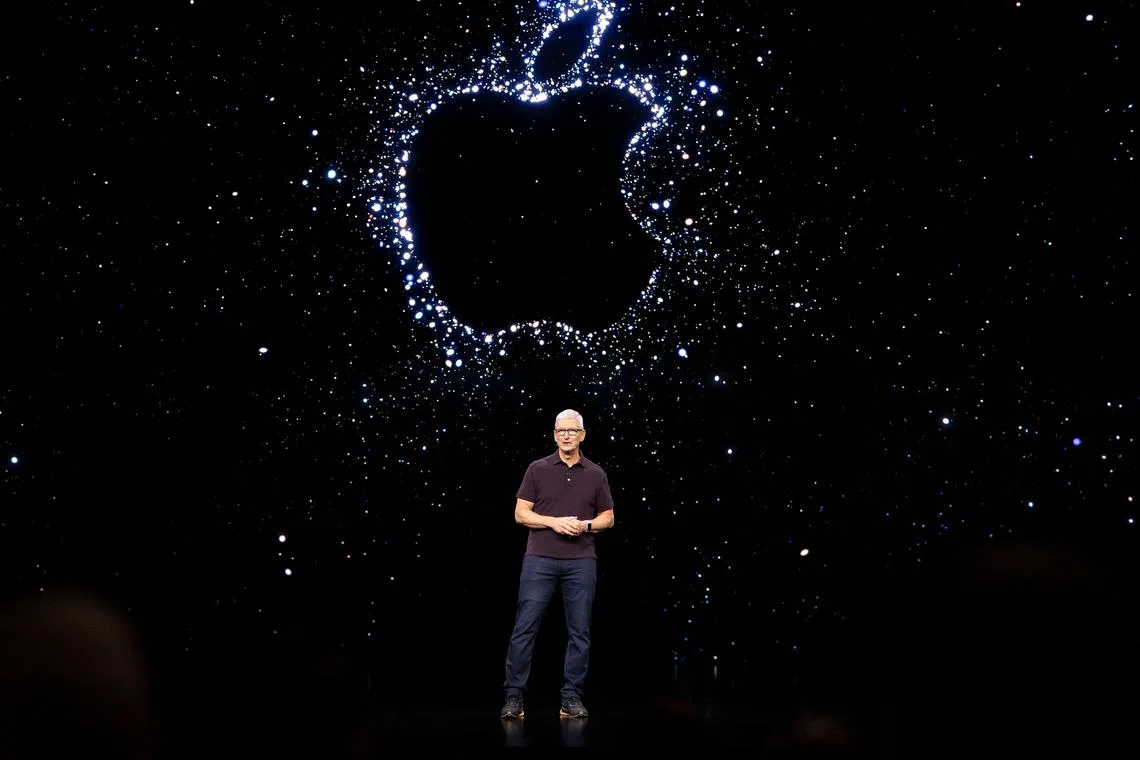Apple prepares to get made-in-US chips in pivot from Asia
Sign up now: Get ST's newsletters delivered to your inbox

Apple currently sources its device processors from TSMC plants located in Taiwan, an area with an outsized share of production.
PHOTO: AFP
BERLIN – Apple is preparing to begin sourcing chips for its devices from a plant under construction in Arizona, marking a major step towards reducing the company’s reliance on Asian production.
Chief executive Tim Cook made the disclosure during an internal meeting in Germany with local engineering and retail employees as part of a recent tour of Europe. He added that Apple may also expand its supply of chips from factories in Europe.
“We’ve already made a decision to buy out of a plant in Arizona, and this plant in Arizona starts up in 2024, so we’ve got about two years ahead of us on that one, maybe a little less,” Mr Cook told the employees.
“And in Europe, I’m sure that we will also source from Europe as those plans become more apparent,” he said at the meeting, which included Apple’s senior vice-president of services Eddy Cue and senior vice-president of retail and people Deirdre O’Brien.
Mr Cook is likely referring to an Arizona factory that will be run by Taiwan Semiconductor Manufacturing Co (TSMC), Apple’s exclusive chip-manufacturing partner. That plant is slated for a 2024 opening. And TSMC is already eyeing a second United States facility, part of a broader push to increase chip production in the country.
Representatives for Apple and TSMC declined to comment.
Intel is also building factories in Arizona that will open as early as 2024. The chipmaker was a major Apple supplier for years, but it is unlikely to recapture that business. Apple has swopped out Intel processors in Macs and other products in favour of its own components, and the chipmaker has an unproven track record of manufacturing other companies’ designs.
The US government is dangling roughly US$50 billion (S$68.5 billion) in incentives – part of legislation known as the Chips and Science Act – to encourage semiconductor manufacturing to expand stateside.
The iPhone maker currently sources its device processors from TSMC plants located in Taiwan, an area with an outsized share of production. During the meeting, Mr Cook said that 60 per cent of the world’s processor supply comes out of Taiwan.
“Regardless of what you may feel and think, 60 per cent coming out of anywhere is probably not a strategic position,” he said.
Processors are at the heart of nearly every Apple product, whether it is the high-end Mac Pro desktop computer, the iPhone or even AirPods. The chips are designed by Apple and then manufactured by TSMC. Bringing even a portion of that production back to the United States – after years of relying on Asia – would be a significant step.
A lingering question is whether the factory as planned is suited to Apple’s needs. The Taiwanese company has said that the plant will initially have a capacity of 20,000 chips per month and use a 5-nanometre production process. That would not satisfy Apple’s near-future desire for more advanced 3-nanometre chips.
TSMC could theoretically introduce advanced production more quickly than it has so far announced. Apple also could potentially use the Arizona production for less complex components in its devices.
While most of the final assembly for Apple products is handled in China and the surrounding countries in Asia, Apple does have a set of suppliers that manufacture components domestically. The Cupertino, California-based firm has touted that Mac Pro models sold in the US are assembled in Texas.
Like the US, Europe has been offering incentives to spur more chip manufacturing.
Apple is growing significantly in Germany. The company has several hundred local engineers working on an effort to replace Qualcomm components in iPhones with a home-grown cellular modem.
More broadly, the US Chips and Science Act and the complementary effort in Europe are poised to reshape the chip industry, Mr Cook said during the meeting in Germany.
“I think you will wind up seeing a significant investment in capability and capacity in both the United States and Europe to try to reorient the market share of where silicon is produced.” BLOOMBERG


